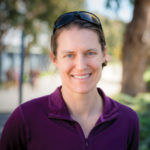2016 Leaders in Higher Education
THIS GUIDE IS NO LONGER ACTIVE. For the current FP Guide, click here.
University of California San Diego,
School of Global Policy and Strategy
Attracting Diverse Students
A new initiative at the University of California San Diego’s School of Global Policy and Strategy (GPS) is helping to lead efforts to boost socioeconomic diversity among graduate students and professionals in international affairs. Assistant Professor Jennifer Burney, an environmental scientist with expertise in global food security, is spearheading a GPS initiative to expose a wide range of undergraduates to careers in public service.
With funding from the not-for-profit Public Policy & International Affairs Program (PPIA), which works to increase diversity in public service, Burney will lead a PPIA Public Service Weekend at UC San Diego this spring.
Many students who are the first in their family to attend college face not just economic barriers, but significant societal barriers that tend to steer them toward the traditional professions, Burney observes. Many aspire to become a doctor, lawyer, or engineer and underestimate their own potential to succeed and lead in a field such as science or public policy.

“The students here have big ambitions to help make a better world. Our program tends to be very quantitative and data-analysis-oriented, and I enjoy seeing students get excited about new quantitative tools they can use.” –Jennifer Burney, Assistant Professor, School of Global Policy and Strategy, UC San Diego
An additional barrier is simply lack of awareness of career alternatives. “That’s the part we can change,” says Burney. “When entering college, most students have no idea what fields like public policy or sociology look like. There is a suite of subjects that undergraduates tend to choose, but they often find that they don’t like what they are studying. We want to be more proactive in showing what we do here at GPS.”
The PPIA Public Service Weekend will also help students in the sciences and in engineering to understand the importance of science in policymaking. “At GPS, we work with UC San Diego’s School of Medicine and School of Engineering, and with the Scripps Institution of Oceanography. We want to integrate scientists into the conversation on policymaking,” says Sonja Steinbrech, GPS director of admissions.
Set to coincide with the 30th annual UC San Diego Undergraduate Research Conference during the weekend of April 22–23, 2017, the Public Service Weekend will welcome UC San Diego undergraduates, community college students, and other undergraduates in the Southern California region. High school students may also benefit. The event will include GPS faculty presentations, workshops for exploring different career possibilities, and more.
“We want students to see what the GPS program looks like and learn about the prerequisites for pursuing graduate study here,” says Burney.
In addition to her research and teaching that focuses on global food security, Burney teaches an introductory course on data analysis. “The students here have big ambitions to help make a better world,” she says. “Our program tends to be very quantitative and data-analysis-oriented, and I enjoy seeing students get excited about new quantitative tools they can use.”
Master’s Degrees offered: See Program Directory
Contents
- 2016 Leaders in Higher Education
- Georgetown University, Walsh School of Foreign Service
- New York University School of Professional Studies, Center for Global Affairs
- University of Denver, Josef Korbel School of International Studies
- Johns Hopkins University School of Advanced International Studies (SAIS)
- National University of Singapore, Lee Kuan Yew School of Public Policy (LKY School)
- Webster University
- University of California San Diego, School of Global Policy and Strategy
- Texas A&M University, Bush School of Government and Public Service
- George Mason University, Schar School of Policy and Government
- University of Kent, Brussels School of International Studies (BSIS)
- The Citadel, The Military College of South Carolina: The Citadel Graduate College
- Columbia University, School of International and Public Affairs (SIPA)